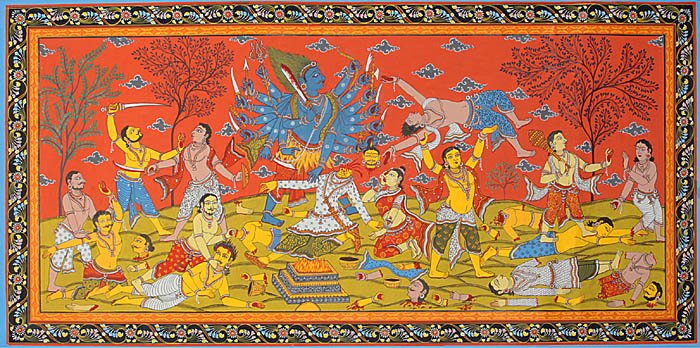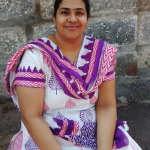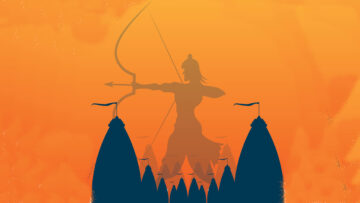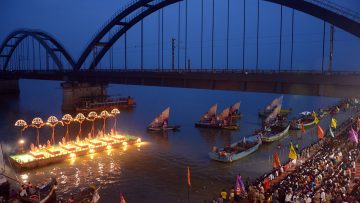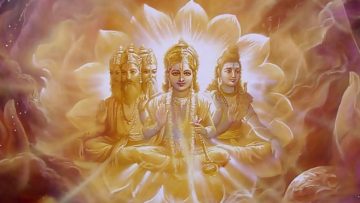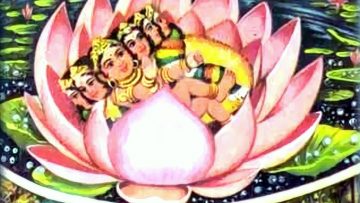(This is the eighth article of the series titled ‘Unknown Tales from the Puranas’. There are myriad stories from puranas and upapuranas that are hardly known to most of us. The series will cover such lesser known tales, as well as unknown versions of the popular tales from pauranika sources. Read the earlier story here. The following story is about the very famous immolation of Sati and subsequent destruction of Daksha’s Sacrifice as recorded in the Kurmapurana. )
The relation of Prajāpati Dakṣa and Śiva has always been strained. The most popular story about the two is that of Dakṣādhvara–mathana, the destruction of the sacrifice of Dakṣa. The most commonly known version of the story involves Satī marrying Śiva against the will of Dakṣa, Dakṣa arranging a prestigious mega-sacrifice, inviting all the gods, goddesses, and demigods, but deliberately avoiding Śiva and Satī, and her visit to the sacrifice despite the suggestion of Śiva against the same.
It results in Dakṣa insulting the couple, Satī’s immolation in the sacrificial fire, Śiva’s enraged creation of Vīrabhadra, and subsequent destruction of the entire sacrifice at the hands of Vīrabhadra. It often progresses into beheading of Dakṣa and his revival with the head of sacrificial ram. Dakṣa is then shown to acknowledge the supremacy of Śiva, and offering him a share in the sacrifice. It also at times results in Śiva wandering in the world carrying the corpse of Satī, and the subsequent creation of fifty-two Śakti–pīṭhas. In either cases, the story proves to be a significant milestone in puranic theology.
Kūrmapurāṇa (I.14 and I.15) offers a little twist in this tale. It dissociates the two stories, of immolation of Satī, and the destruction of the sacrifice, into two separate lifetimes. It states that during the first lifetime, Svāyambhuva Dakṣa was the son of Brahmadeva, and father of Satī. Satī was married to Śiva. When Dakṣa once visited their abode, Śiva presented him with suitable offerings; however Dakṣa was not satisfied with them.
He probably took it as an insult, and returned it with interest later. Once when Satī was casually visiting him, he insulted Śiva as the worst of his sons-in-law, and Satī as the worst daughter. He asked her to immediately get lost. Enraged and insulted, she immolated herself. She was later reborn as Pārvatī, the daughter of Himālaya.
When Śiva got to know of Dakṣa’s role in her death, he became furious, and cursed him to be reborn as a Kṣatriya, and produce a son in his own daughter. Dakṣa was thus born as a son of the ten Prachetās, and garnered enmity with Śiva right from the birth. King Prāchetas (Dakṣa) once started to perform a huge sacrifice, under the guidance of Viṣṇu. All the gods, apart from Śiva were invited to partake their respective shares in the sacrifice.
Sage Dadhīci realized the absence of Śiva, and reprimanded the rude and proud king, for not respecting viśvātmā Śiva. King responded that there weren’t any mantras assigned to Śiva and his wife. Besides, he was inauspicious, destructive, and naked skull-bearer. Only Viṣṇu is suitable to be called viśvātmā, and worshipped accordingly.
The other gods or sages also couldn’t realize the greatness of Śiva. Brahmā disappeared from the scene, probably sensing the upcoming troubles. King then started the sacrifice, requesting Viṣṇu’s protection. Sage Dadhīci once again reproached him, and cursed the ignorant sages to be away from the path instructed by the vedas, and lose the merit of their education and conduct. He then retired to the refuge of Śiva.
Here, Pārvatī sensed this entire episode, and went to Śiva. She told him that it is her father from the earlier birth, who is insulting Śiva yet again in this birth. She requested him to confer upon her, the destruction of this so-called sacrifice, as a boon. Śiva accordingly created Vīrabhadra, a ferocious, multi-limbed, destructive form of Śiva himself. He created thousands of gaṇas like himself, and accompanied by Bhadrakālī created by Pārvatī, set to attack the sacrifice held at Gaṅgādvāra.
The army approached the sages participating in the sacrifice, and demanded shares in the sacrifice. When the sages expressed their ignorance about mantras regarding the same, the mantras themselves admonished the sages, and left for their own abodes. Vīrabhadra and his army then destroyed the entire sacrifice. He harmed many deities who tried to obstruct his actions. Bhaga, Pūṣā, Candra, Agni, and many other gods and sages were punished by the ferocious warrior.
Visnu tried to flee the scene atop his mount Garūḍa. Vīrabhadra obstructed his divine discus, and created thousands of Garūḍas to counter his single Garūḍa. Horrified with these developments, actual Garūḍa ran away from the scene. Brahmā reappeared and appeased Śiva. King also realized his mistake, and propitiated Satī Pārvatī. She then requested Śiva to end this destruction, and bless the gods and sages.
Śiva obliged her requests, and ordered the sages to offer him shares in all sacrifices, and worship him. He also asked King to be his devotee and be blessed with gaṇeśatva at the end of the kalpa. Śiva then returned to his abode with Pārvatī.
There are many interesting and noteworthy points in this tale. Firstly, the forever tussle between Śiva and Dakṣa finds a new storyline in this tale. The supposed insult of Dakṣa by Śiva is a new addition to the story. Generally, it is a continuation of the clash between Śiva and Brahmā, the father of Dakṣa; usually due to incestuous sins on part of Brahmā. Even in this tale, the curse given to Dakṣa is not just a rebirth as a Kṣatriya, but also producing a son in his own daughter (though we do not find any continuation of the curse later).
Speaking of the curse by Śiva, the general significance assigned to Brāhmaṇa is highlighted, by stating birth as a Kṣatriya to be the curse. Brahmapurāṇa (34.34-35) in fact clarifies the point, by stating a counter-curse given to Śiva. It states that Dakṣa cursed him to lose the share in sacrifices, as well as no worship with other gods. As a response to which, Śiva claimed a separate place in sacrifices and worship.
The role of Viṣṇu is also deliberately cut short. He is said to be the protector of the said sacrifice, but he seems to simply try to flee the war-scene. It is also interesting to note, that the deities punished by Vīrabhadra are mainly the Vedic solar deities, just like Viṣṇu. Role of Dadhīci is also interesting. He also appears in this tale in Śivapurāṇa. Though no special rewards come his way, he is extremely loyal and devoted to Śiva.
Creation of Vīrabhadra, Bhadrakālī, and other gaṇas, as well as thousands of garūḍas, elicits fantasy, awe, and reverence. Also, the eulogy of Pārvatī by Dakṣa adds the layer of śākta superiority. The promise of gaṇeśatva to Dakṣa hints at the complete subjugation of Dakṣa, as well as Brahmā.
The tale is a confluence of significance of sacrificial institution, and the idea of Bhakti. Subjugation of the lord of sacrifice, Viṣṇu, and lord of the mantras, Brahmadeva, also echoes this point. The tale culminates into both, Śiva getting a share in all sacrifices, as well as Dakṣa becoming his devotee.
We can surely mark this version of the tale, as a significant step in systematic replacement of the complicated systems of sacrifice, with the simplistic ideas of devotion and worship, thereby making the religious domain more accessible to the masses.
Disclaimer: The opinions expressed in this article belong to the author. Indic Today is neither responsible nor liable for the accuracy, completeness, suitability, or validity of any information in the article.

